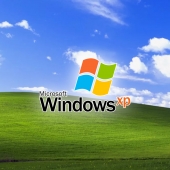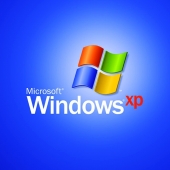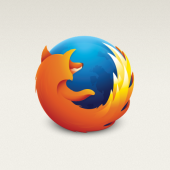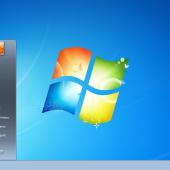-
It's Windows XP's 20th birthday and way too many still use it
Today is the 20th anniversary of Windows XP, and although the operating system reached the end of support in 2014, way too many people continue to use the insecure version of Windows.
- October 25, 2021
- 11:27 AM
 21
21
-
Windows XP makes ransomware gangs work harder for their money
A recently created ransomware decryptor illustrates how threat actors have to support Windows XP, even when Microsoft dropped supporting it seven years ago.
- April 06, 2021
- 06:00 PM
 0
0
-
Windows XP and Server 2003 compiled from leaked source code
A Windows developer has successfully compiled both Windows XP and Windows Server 2003 from source code leaked online last week.
- September 30, 2020
- 12:46 PM
 2
2
-
The Windows XP source code was allegedly leaked online
The source code for Windows XP SP1 and other versions of the operating system was allegedly leaked online today.
- September 25, 2020
- 12:33 AM
 13
13
-
Windows CTF Flaws Enable Attackers to Fully Compromise Systems
Several critical design flaws were found by Google Project Zero security researcher Tavis Ormandy in the CTF subsystem (MSCTF) of the Windows Text Services Framework (MSCTF), present in all versions going back as far as Windows XP.
- August 14, 2019
- 03:48 PM
 1
1
-
Microsoft is Shutting Down their Classic Internet Games Service
It has been a good run, but Microsoft has finally decided to shutdown the services powering their classic multiplayer Microsoft Internet Games. After almost 20 years, Windows users will no longer be able to fire up Internet Spades, Backgammon, or Checkers and get quick game with someone on the other side of the world.
- July 10, 2019
- 06:02 AM
 2
2
-
Microsoft Warns Users Again to Patch Wormable BlueKeep Flaw
Microsoft issued a second warning for users of older Windows releases to patch their systems to block potential attackers from abusing the critical Remote Desktop Services (RDS) remote code execution vulnerability dubbed BlueKeep.
- May 31, 2019
- 09:00 AM
 1
1
-
Microsoft Fixes Critical Remote Desktop Flaw, Blocks Worm Malware
Microsoft patched today a critical Remote Code Execution vulnerability found in the Remote Desktop Services platform which can allow malicious actors to create malware designed to propagate between computers running vulnerable RDS installations.
- May 14, 2019
- 01:00 PM
 0
0
-
Steam Will No Longer Support Windows XP and Vista in 2019
In what many would consider overdue, Steam will no longer support the Windows XP and Windows Vista operating systems starting on January 1st 2019.
- June 13, 2018
- 06:50 PM
 2
2
-
Apple Dropping iTunes Support for Apple TV 1st Gen, Windows XP, & Vista
Apple has announced that starting on May 25th 2018, iTunes will no longer be supported on Windows XP, Vista, and on Apple TV 1st generation. According to Apple this is because of security changes that will prevent Windows XP, Vista, and Apple TV 1st from using certain features of the iTunes store.
- February 26, 2018
- 07:09 PM
 0
0
-
Mozilla to End All Firefox Support for XP and Vista in June 2018
Mozilla announced today plans to discontinue any support for the Firefox browser on Windows XP and Vista in June 2018.
- October 04, 2017
- 07:08 PM
 3
3
-
Locky Ransomware Returns, but Targets Only Windows XP & Vista
The Locky ransomware is back, spreading via a massive wave of spam emails distributed by the Necurs botnet, but the campaign appears to be a half-baked effort because the ransomware is not able to encrypt files on modern Windows OS versions, locking files only on older Windows XP & Vista machines.
- June 22, 2017
- 03:48 AM
 1
1
-
Microsoft Issues Windows XP Security Updates for Previously Ignored NSA Hacking Tools
In two blog posts today, Microsoft announced it issued new security patches for Windows XP users to protect them against "potential nation-state activity" that could cause "destructive cyber attacks" similar to the WannaCry outbreak that hit users last month.
- June 13, 2017
- 04:50 PM
 6
6
-
Security Firm Releases Windows XP Patch for NSA Exploit ESTEEMAUDIT
Cyber-security firm enSilo has released a patch for Windows XP and Windows Server 2003 that will protect against attacks via ESTEEMAUDIT, a hacking tool dumped online by the Shadow Brokers last month, and allegedly developed by the NSA.
- May 25, 2017
- 09:27 AM
 0
0
-
Over 98% of All WannaCry Victims Were Using Windows 7
Numbers released by Kaspersky Lab on Friday reveal that over 98% of all documented WannaCry infections were running versions of the Windows 7 operating system.
- May 20, 2017
- 04:15 AM
 5
5
-
Firefox 53, Released Today, Drops Support for Windows XP and Vista
Mozilla is expected to officially release Firefox 53 later today, but the Firefox 53 installer is already available on Mozilla's FTP servers, just in case some users can't wait to get their hands on the new release.
- April 19, 2017
- 09:00 AM
 0
0
-
Blizzard Ending Support for Windows XP and Vista
Blizzard announced over the weekend that it intends to end support for gamers on Windows XP and Vista operating systems by the end of 2017.
- February 22, 2017
- 04:43 AM
 0
0
-
Gmail Drops Support for Windows XP and Vista Users on Chrome
Google says that starting with February 8, Chrome users will have to use version 54 or 55 (current) if they want to access their Gmail accounts.
- February 02, 2017
- 05:50 AM
 8
8
-
Mozilla to Support Firefox for Windows XP and Vista until September 2017
Just before the Christmas holiday, Mozilla announced plans to support Firefox for Windows XP and Vista until at least September 2017.
- December 25, 2016
- 05:55 AM
 3
3






















